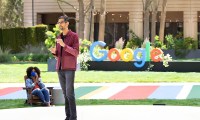Cats have been turning cardboard boxes into sources of amusement for centuries. Now Google is following their lead with Cardboard, a DIY project that teaches you how to build a virtual reality headset with only an app, an Android smartphone, and a cardboard box. Oculus Rift, eat your heart out (or not).
Before you can create your own VR headset, you’ll need to go buy all the items on Google’s shopping list:
- Corrugated cardboard sheet, preferably in E Flute thickness. The smallest your box can be is 8.75 x 22 x 0.06 inches. Google suggests looking here and here.
- Lenses with a 40mm focal distance will work, but Biconvex lenses have the least distortion. Google recommends the Durovis OpenDive Lens Kit available here and here.
- Two magnets: One neodymium ring magnet this or this – and one ceramic disk magnet – like this or this. The magnets must be 0.75 inches in diameter and 0.12in thick.
- Two strips of velcro, measuring 0.75 x 1.25 inches.
- Rubber band to stop the phone from slipping. The band should be 3.2 inches long.
- The NFC tag is optional and you’ll need to program it with the URL cardboard://v1.0.0
You’ll also need a ruler, glue, and scissors, an X-acto knife, or laser cutter to complete the project. Once you’ve complied all the materials, Google will explain how to make the perfect VR headset. As soon as you’ve finished, you should have a fully functional VR headset.
According to the Google Play Store app posting, the Cardboard app works with the following applications:
- Earth: Fly where your fancy takes you on Google Earth.
- Tour Guide: Visit Versailles with a local guide.
- YouTube: Watch popular YouTube videos on a massive screen.
- Exhibit: Examine cultural artifacts from every angle.
- Photo Sphere: Look around the photo spheres you’ve captured.
- Street Vue: Drive through Paris on a summer day.
- Windy Day: Follow the story (and the hat) in this interactive animated short from Spotlight Stories.
Google hopes that its Cardboard project will show people just how easy it is to make a basic VR headset and encourage more developers to work on new VR experiences for everyone.
Editors' Recommendations
- Google is launching a powerful new AI app for your Android phone
- Google’s Android monopoly finds its biggest challenge, and Apple might be next
- Google launches Switch to Android app to chirping crickets
- The best VR headsets for the iPhone
- Google Pixel 5 vs. iPhone 11: Should you buy Android’s best or iOS’s finest?



